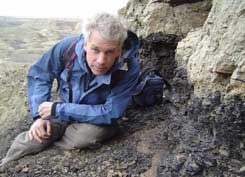[meteorite-list] Canadian Scientists Seeks Farmers' Aid in Tracking Down Meteorites
Ron Baalke baalke at zagami.jpl.nasa.govMon Jul 4 20:36:15 EDT 2005
http://www.fairviewpost.com/story.php?id=170473
Space scientists seek farmers' aid
by Olav Rokne
Fairview Post (Canada)
July 5, 2005
Fairview Post - University scientists are asking Fairview farmers for
help in tracking down space rocks.
Anyone who thinks they have found a meteorite is invited to bring it by
the public library in Fairview anytime from 1-5 p.m. on July 26 to have
it identified and analyzed.
"These meteorites are quite valuable," says Tom Weedmark, the
undergraduate geology student who will be examining the potential
meteorites, explaining that they can be worth thousands of dollars to
collectors depending on shape, size, composition and age.

"Any meteorites we do find, we're just there to identify them and let
people know what they have and what their options are with them."
The visit is part of a summer research project headed by Dr. Alan
Hilderbrand, a geologist from the University of Calgary who has students
visiting small towns to identify and report on any meteorites farmers
have found in their fields.

Dr. Alan Hildebrand
Earth," Weedmark says, explaining that the composition of the meteorites
can help scientists understand the early solar system.
"Especially some of the more primitive ones -- this one here," he says,
holding up a dark gray rock the size of an apple, "is almost 4.5 billion
years old."
Most meteorites contain at least some iron metal (actually an alloy of
iron and nickel).
Almost invariably, such meteorites are easy to identify because they are
magnetic, heavier than other rocks and have shiny flecks in the centre.
Many meteorites are pitted with depressions that look as if someone
pressed their thumb into the material. If they have sat in a field for a
long time, they might be reddish brown -- as the iron ore in the stone
rusts.
"If at all possible, it would be helpful if people keep track of where
the meteorite came from," Weedmark says. "GPS is obviously the best, but
a lot of times people found their meteorites 10 years ago and don't know
exactly where it was... those are still worth bringing in."
Across the globe, you'll find on average one meteorite per square
kilometre -- a statistic that Weedmark says is misleading as they tend
to be found in clusters.
"The vast majority of them are from the asteroid belt between Mars and
Jupiter."
(For more info - The Prairie Meteorite Search - kn)
More information about the Meteorite-list mailing list

